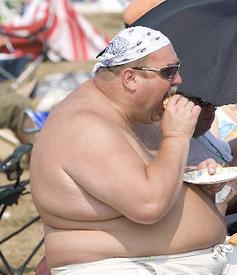3500 cals per pound is "wrong" but it's good enough

EvgeniZyntx
Posts: 24,208 Member
Why do we use consider that 3500 calories equals the energy deficit necessary to lose 1 lb of fat? Is this right? Why am I not losing a pound of fat for a 3500 calorie deficit? Will my deficit vs lbs lost change over time? (I'll get to these, promise)
First, consider:
A) A pound corresponds to 453.59 g.
 There are about nine calories per gram of fat (this is an estimate of the energy available in a gram of ingested fat, it's wrong but we'll go with it).
There are about nine calories per gram of fat (this is an estimate of the energy available in a gram of ingested fat, it's wrong but we'll go with it).
That corresponds to 4086 cals per pound of fat. So if the fat lost during weight-loss was just dense lipids we could consider that energy deficit - But dietary fat isn't exactly the same as body fat. Physiological fat is held in cells mostly and needs some connective tissue and vessels, etc. to support it.
C) Human fat tissue is estimated to be 87% lipid.
Now that gives us 3555 cals per lb! Pretty close!
Now this 87% number comes from where? Hmmm. A little research into the archives and we find that it references the calculations of Wishnofsky (1952) from the work of one Bozenraad (1911). I find it interesting to note that this number, now taken as fact, was being challenged in 1959.

(from Techniques for Measuring Body Composition, pg 176 - available in Google scholar)
Now that doesn't mean that 3500 cals/lb is outright wrong, just that it's an estimate and might be quite a bit off.
But, let's take this further and look at how much an energy deficit corresponds to a pound of weight loss in more recent literature. What happens when scientists actually observe as the required energy deficit per weight loss?
This is the important part that might affect your weight loss...
http://www.nature.com/ijo/journal/v32/n3/full/0803720a.html

In these graph, the author looks at data from various studies and shows the deficit needed for a specific weight loss versus starting fat mass or body weight. Unfortunately he uses metric KJ rather than calories but that red line corresponds to the rule of thumb of 3500 calories/lb lost. This estimate seems reasonable at 50kg of intial body fat. But for lean individuals the calorie deficit observed to lose might be much lower.
Wait! What?
Why is it then so hard to lose the last 10lbs? Of course, that energy deficit is harder to achieve in a leaner individual if they are already eating less and getting less of a "burn" from exercise (because smaller and lighter and more effcient), because adherence might have waivered or due to, but only in part, the effects of adaptive thermogenesis.
So I should stop because it's all inexact?

You might feel that this is confusing and might as well give up?
But the key message is that the calorie deficit of 3500 / lb of weight loss is an estimate. And it varies not-so-slight not only from individual to individual but also over the weight loss period. There is no need to focus on the the exact number of pounds that will be lost, or the exact calories down to the single digits.
At the end of the day 3500 might be 2600 or 4000. The burn you consider 400 might be 350 or 450. But it doesn't matter as long as we work with a general net deficit, observe and adjust. Adherence to logging as accurately as possible helps to offset if not reduce some of the inherent variability in these estimates.
It's physiology not physics.
tl;dr -- 3500 cals / lb of fat lost is an estimate. Weight loss for leaner individuals is reported to occur at a higher rate in some literature. Use the number as an estimate and live happily ever after.
First, consider:
A) A pound corresponds to 453.59 g.
That corresponds to 4086 cals per pound of fat. So if the fat lost during weight-loss was just dense lipids we could consider that energy deficit - But dietary fat isn't exactly the same as body fat. Physiological fat is held in cells mostly and needs some connective tissue and vessels, etc. to support it.
C) Human fat tissue is estimated to be 87% lipid.
Now that gives us 3555 cals per lb! Pretty close!
Now this 87% number comes from where? Hmmm. A little research into the archives and we find that it references the calculations of Wishnofsky (1952) from the work of one Bozenraad (1911). I find it interesting to note that this number, now taken as fact, was being challenged in 1959.

(from Techniques for Measuring Body Composition, pg 176 - available in Google scholar)
Now that doesn't mean that 3500 cals/lb is outright wrong, just that it's an estimate and might be quite a bit off.
But, let's take this further and look at how much an energy deficit corresponds to a pound of weight loss in more recent literature. What happens when scientists actually observe as the required energy deficit per weight loss?
This is the important part that might affect your weight loss...
http://www.nature.com/ijo/journal/v32/n3/full/0803720a.html

In these graph, the author looks at data from various studies and shows the deficit needed for a specific weight loss versus starting fat mass or body weight. Unfortunately he uses metric KJ rather than calories but that red line corresponds to the rule of thumb of 3500 calories/lb lost. This estimate seems reasonable at 50kg of intial body fat. But for lean individuals the calorie deficit observed to lose might be much lower.
Wait! What?
Why is it then so hard to lose the last 10lbs? Of course, that energy deficit is harder to achieve in a leaner individual if they are already eating less and getting less of a "burn" from exercise (because smaller and lighter and more effcient), because adherence might have waivered or due to, but only in part, the effects of adaptive thermogenesis.
So I should stop because it's all inexact?

You might feel that this is confusing and might as well give up?
But the key message is that the calorie deficit of 3500 / lb of weight loss is an estimate. And it varies not-so-slight not only from individual to individual but also over the weight loss period. There is no need to focus on the the exact number of pounds that will be lost, or the exact calories down to the single digits.
At the end of the day 3500 might be 2600 or 4000. The burn you consider 400 might be 350 or 450. But it doesn't matter as long as we work with a general net deficit, observe and adjust. Adherence to logging as accurately as possible helps to offset if not reduce some of the inherent variability in these estimates.
It's physiology not physics.
tl;dr -- 3500 cals / lb of fat lost is an estimate. Weight loss for leaner individuals is reported to occur at a higher rate in some literature. Use the number as an estimate and live happily ever after.
0
Replies
-
Great post, I need to read it more carefully in the evening. Thanks for posting it, I was wondering recently about that and how it affects the estimates of TDEE through the diaries.0
-
Thanx very informative and very interesting. (:0
-
Are you saying that in reality nothing is ever 100% accurate?Why do we use consider that 3500 calories equals the energy deficit necessary to lose 1 lb of fat? Is this right? Why am I not losing a pound of fat for a 3500 calorie deficit? Will my deficit vs lbs lost change over time? (I'll get to these, promise)
First, consider:
<SNIP>
tl;dr -- 3500 cals / lb of fat lost is an estimate. Weight loss for leaner individuals is reported to occur at a higher rate in some literature. Use the number as an estimate and live happily ever after.
So that scientist that I was speaking with once about blood/alcohol analysis was telling the truth when she said that there is a margin of error in everything because there are no certainties?0 -
Are you saying that in reality nothing is ever 100% accurate?Why do we use consider that 3500 calories equals the energy deficit necessary to lose 1 lb of fat? Is this right? Why am I not losing a pound of fat for a 3500 calorie deficit? Will my deficit vs lbs lost change over time? (I'll get to these, promise)
First, consider:
<SNIP>
tl;dr -- 3500 cals / lb of fat lost is an estimate. Weight loss for leaner individuals is reported to occur at a higher rate in some literature. Use the number as an estimate and live happily ever after.
So that scientist that I was speaking with once about blood/alcohol analysis was telling the truth when she said that there is a margin of error in everything because there are no certainties?
maybe :bigsmile:0 -
Great post and I completely agree with your conclusions re: estimates. It's the same argument that comes up about the inaccuracies inherent in calorie counting. Just because it's not 100% accurate doesn't mean it can't still be used effectively.0
-
tagging for when my brain is awake0
-
TLDR
Ate ice cream / donuts and lost a lb. Thanks!0 -
I'm sticking with 3500. Nothing in your post told me another # was better and it has worked so far.0
-
then i am free to believe that 6 is the new 90
-
Ummm....coffee?0
-
It's all a guess no matter how you shake it up. Quite frankly, there is no definative amount of calories a person burns for a specific activity. My goal is to have a deficit of 3500 calories per week. One week that may = .8lbs lost, another it may be 1.3. It gets me in the ball park and t hat is good enough. If you try to get to technical you take the joy out of the journey.0
-
bump0
-
I like this post. That's a very informative way of saying "stop expecting weight loss to be linear and perfectly predictable." Very much appreciated!0
-
Very good post!0
-
I'm sticking with 3500. Nothing in your post told me another # was better and it has worked so far.
That's the point - any number around that one is good enough.
Someone might experience something a bit differently. That too is good enough.0 -
Tag-a-licious!0
-
 0
0 -
I really believe this is where the 3500 calorie/LB of fat comes from. 2600
At the end of the day 3500 might be 2600 or 4000. The burn you consider 400 might be 350 or 450. But it doesn't matter as long as we work with a general net deficit, observe and adjust. Adherence to logging as accurately as possible helps to offset if not reduce some of the inherent variability in these estimates.
It's physiology not physics.
3500
4000. Estimated avg on collected data, with room for error on either end. Seems to do the trick anyways.0 -

Just give up.. The roommate agreement is completely useless!0 -
In....for the pretty pictures
 0
0 -
I'm sticking with 3500. Nothing in your post told me another # was better and it has worked so far.
Go Canes!!!! And since you are from Tampa go Bucs and Go Rays!!!!0 -
Good post, thanks!0
-
:flowerforyou:0
-
*dances*0
-
I'm sticking with 3500. Nothing in your post told me another # was better and it has worked so far.
I feel like...never mind. Just...never mind.0 -
Where's that like button!?!?
And, of course, calorie counts for foods are equally squishy but "close enough" based on assumptions from the 1950s, industry pressure, and a whole passel of other variants.
But, as another MFPer once said, just because one tire is flat doesn't mean we go stick nails in the other three. Do the best you can with what you've got.0 -
In to follow0
-
I like this post. That's a very informative way of saying "stop expecting weight loss to be linear and perfectly predictable." Very much appreciated!
Exactly this. I can do virtually the same thing week after week but one week I'll be up .6 and the next week I'll be down two. It's the overall trend and what works in the long run. Everyone has to tweak their calories until they find what works for them. And then after awhile, you have to tweak it again. It's people's impatience that causes all the frustration and constant searching for something "new and improved"
Thanks for the great post!0
This discussion has been closed.
Categories
- All Categories
- 1.4M Health, Wellness and Goals
- 398.2K Introduce Yourself
- 44.7K Getting Started
- 261K Health and Weight Loss
- 176.4K Food and Nutrition
- 47.7K Recipes
- 233K Fitness and Exercise
- 462 Sleep, Mindfulness and Overall Wellness
- 6.5K Goal: Maintaining Weight
- 8.7K Goal: Gaining Weight and Body Building
- 153.5K Motivation and Support
- 8.4K Challenges
- 1.4K Debate Club
- 96.5K Chit-Chat
- 2.6K Fun and Games
- 4.8K MyFitnessPal Information
- 13 News and Announcements
- 21 MyFitnessPal Academy
- 1.6K Feature Suggestions and Ideas
- 3.2K MyFitnessPal Tech Support Questions





















